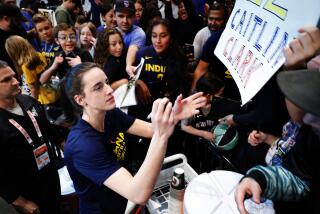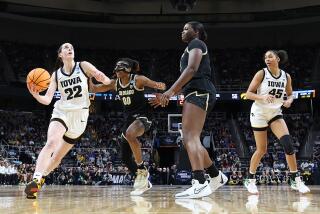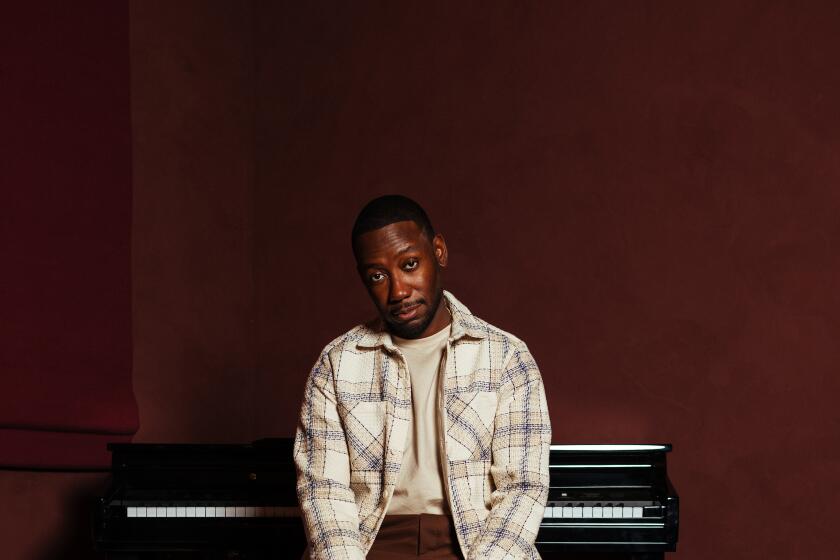‘Love and Basketball’ Scores on the Strength of Its Main Players
Choosing “Love and Basketball” as a title for a movie is a bit like slapping a “Hops and Barley” label on a can of beer. It either grabs you with its bare-bones audacity or else sits there, dumbly, while your eyes wander past.
Like its title, this charming movie skirts the line between no-brainer directness and the sort of wise restraint that suggests an active, mischievous mind at work. Impressively, it stays pretty consistently on the side of wisdom.
The movie is smarter than it has to be, but it’s the sort of low-key smart that can be easily overlooked. Writer-director Gina Prince-Bythewood doesn’t care if you recognize how hard it is to juggle two distinctly different types of movies (make that three, since the romance and sports elements here don’t obscure the feminist fable that is the film’s heart). And it’s OK with her if you don’t fully appreciate the difficulty of her following her lover-athletes from the age of 11 to their mid-20s or showing the way painful and complex relationships with parents can influence the trajectory of a child’s life.
Accomplishing all of this in her first movie is about as challenging as making a three-point shot from center court at the buzzer with the score tied and Magic Johnson on defense. Prince-Bythewood very nearly pulls it off. She wants to be noticed--she’s not above striking a fancy pose or two--but she’d be content with the audience growing and staying involved with her two likable main characters.
The title says “Love and Basketball,” but for much of the movie, Quincy (Omar Epps) and Monica (Sanaa Lathan) seem to think the “and” is an “or.” They are driven ballplayers, middle-class next-door neighbors who for different reasons value the game above all else. Childhood sweethearts (for about two minutes), it takes them years to realize that they really are in love. They have difficulty, though, balancing their dedication to the game and each other. Even when, during their senior year of high school, they become lovers, the bliss doesn’t last. A wedge is driven between them that keeps them apart for years as they each pursue professional basketball careers.
*
This is an extremely well-acted movie. Lathan in particular is a marvel, guiding her character from her awkward teenage tomboy years to womanly self-possession with seamless ease. She’s the movie’s emotional center, and her work here should make her a star. And not only is her acting first-rate, she couldn’t play basketball before getting the role yet you’d think she grew up on the court.
The acting, though, is only one of the qualities that gives this film, despite its occasional tilts toward sentimentality, an underlying sense of authenticity. Prince-Bythewood gets the details right--nuances of speech, behavior, the humor. The film is tethered too tightly to the reality of daily experience to stray too far into contrivance.
This is Prince-Bythewood’s first feature film as both a writer and director, and she shows admirable command of her craft. A writer for television shows such as “A Different World,” “South Central” and “Felicity,” she earned an Emmy nomination for writing and directing a “CBS Schoolbreak Special” in 1994. She drew upon her own background as a high school and UCLA athlete for this movie.
*
Watching “Love and Basketball,” you realize how rare it is to see a high school or college dance in a movie that doesn’t ring false or to see middle-class black people--in a film aimed at mass audiences--portrayed without regard to audience expectation. They’re just people. Like the characters in Spike Lee’s more realistic efforts (Lee is a producer of “Love and Basketball”), ethnic details are presented matter-of-factly.
An incident involving Quincy’s relationship with his pro ball player father (Dennis Haysbert) provides a major plot point. Monica’s difficult relationship with her mother (Alfre Woodard) is just as important to the movie on a thematic level, but it isn’t as well integrated into the story and so feels tacked on. It’s also hard to understand why--beyond the needs of the plot--Quincy remains so aloof from Monica long after it should be clear that they belong together. Clearly Prince-Bythewood is straining to set up a climactic basketball contest that only works if everything is riding on the outcome.
These and other quibbles aside, “Love and Basketball” is an admirable achievement. Mirroring Monica’s growth, the film evolves as it goes. For most of its two-hour length, it involves us in the concerns of the very young--dating, goal-setting, athletic competition, fitting in. By the fourth quarter, though, it has blossomed into something more moving and more mature. As the clock runs out, the stakes get suddenly higher. A mark of this movie’s accomplishment is how much we care about seeing the players win.
* MPAA rating: PG-13 for sexuality and language. Times guidelines: The movie is tastefully restrained in all respects.
‘Love and Basketball’
Sanaa Lathan: Monica Wright
Omar Epps: Quincy McCall
Dennis Haysbert: Zeke McCall
Debbie Morgan: Nona McCall
Alfre Woodard: Camille Wright
Harry J. Lennix: Nathan Wright
Regina Hall: Lena Wright
A New Line Cinema release of a 40 Acres and A Mule Filmworks production. Director and screenplay Gina Prince-Bythewood. Producers Spike Lee and Sam Kitt. Executive producer Andrew Z. Davis. Cinematographer Reynaldo Villalobos. Production designer Jeff Howard. Editor Terilyn A. Shropshire. Costume designer Ruth Carter. Running time: 2 hours, 4 minutes.
In general release.
More to Read
Only good movies
Get the Indie Focus newsletter, Mark Olsen's weekly guide to the world of cinema.
You may occasionally receive promotional content from the Los Angeles Times.










